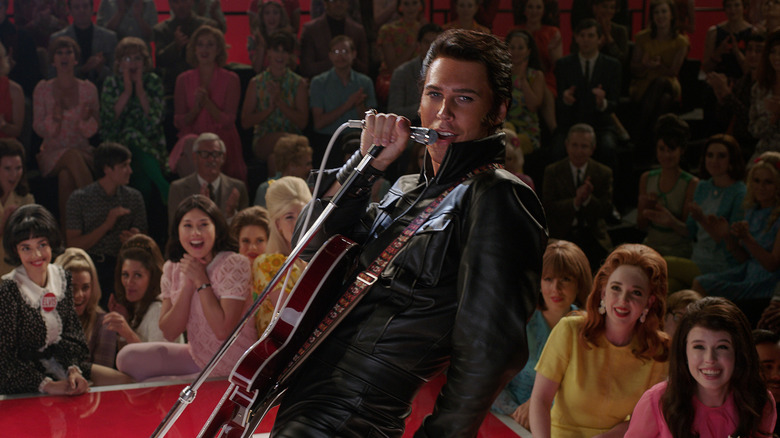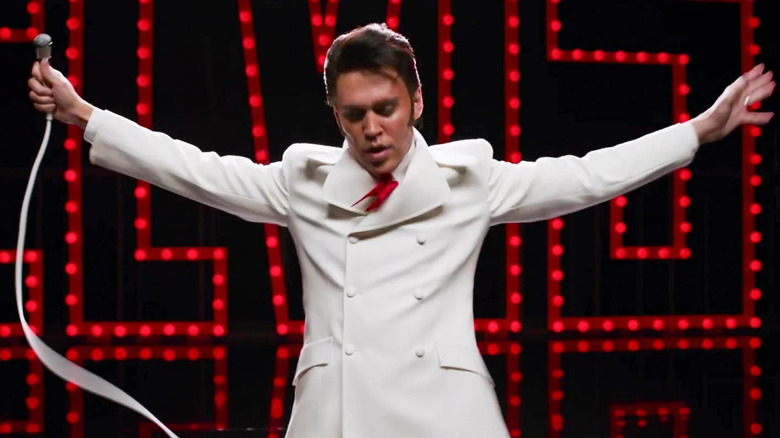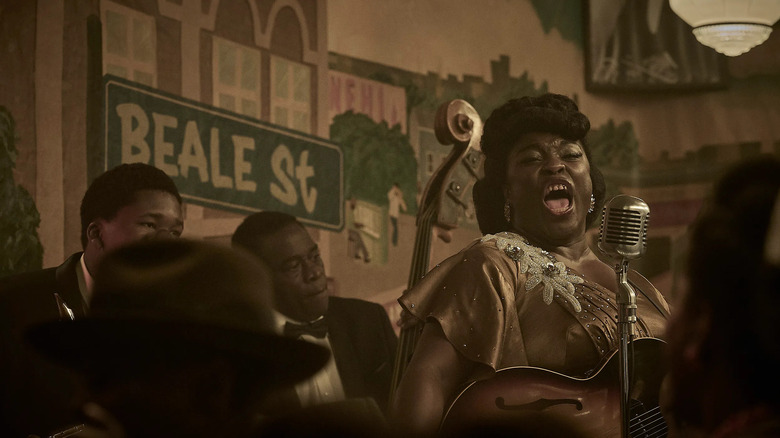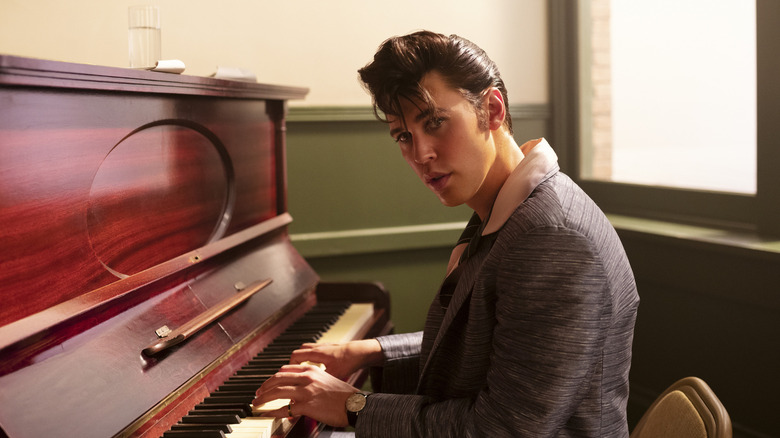Elvis Music Executive Producer Elliot Wheeler On Living A Composer's Dream [Interview]
There are only two minutes without music in "Elvis." Baz Luhrmann's epic is wall-to-wall jams that bridge the past and the present. The biopic uses Elvis' classics not as wallpaper, but as storytelling. Right from the beginning, a new spin on "Suspicious Minds" blasts a sound of doom.
The nearly three-hour drama is such an audibly immersive experience. One of the key figures behind the film's sprawling, rocking sound is the composer and music executive producer, Elliot Wheeler. "Elvis" isn't Wheeler's first time collaborating with Luhrmann. The two worked on "The Great Gatsby" and Netflix's "The Get Down." Now, for the last five years, the two have worked on "Elvis." Wheeler had over 800 songs to work with from the icon's catalogue. The entire experience was, as he described it, "a composer's dream."
'Elvis had at least four different voices throughout his career'
Let's begin with the end. What was involved in the film mix of "Unchained Melody?"
Well, that one, to be honest, was a tricky one. One of our mixers, Evan McHugh, spent a long time trying to get that to sit exactly right. It's a mixture of a live recording that came off the mix, and the version that most people know actually had overdubs done on top of it. So, we went back to the original masters, and we were very lucky throughout the entire process of having RCA and Legacy just give us the vault. We had full access, which was amazing for audio geeks. The vocals by itself are amazing.
Evan spent a long time trying to get back inside the vocal, and give it the warmth that it needed while still giving it the power, particularly some of those last really operatic notes. They are incredible when he's at the top of his range there and he's belting. It's amazing to think that a man who was such a physical shell of the being that he once was still had so much power and emotion in his voice. I think it speaks to him as a performer and him as a person that he was still able to pour his entire soul into that performance, and that's what we're trying to capture at the end there. So for that one, you are hearing Elvis' voice. Austin was amazing that he managed to perform that entire song, and if you actually heard his performance of it, it's incredible as well, but really, all we did there was we added a few of Austin's breaths and a few of his visuals.
How did Austin capture Elvis' breathing techniques when he sang?
So much of what happened with his breathing happens because of his movement. There's a line in the film that he says during his recording of "Heartbreak Hotel," where he says, "If I can't move, I can't sing." Apart from a traditional vocal exercise that we did, Austin was doing vocal practice every day. The man's work ethic is insane because on top of all the lines he was having to do, he was having to learn all the choreography, and we had him doing over an hour or two just on vocal exercises, not even the singing. So, he had an incredible vocal stamina by the end of it because he knew he was going to have to perform for eight, nine hours a day and to try and build up that vocal fitness.
We worked really closely with the movement coach Polly Bennett, because say, for something like "If I Can Dream," the movements that he's doing, where he's so much in his body, we had to work out what he was doing physically to work out how that was affecting his voice as well. There's a thing where he's sort of bending down, and really hunching into his solar plexus, you know that's going to affect the way that he's performing.
Movement, and vocals, and vocal performance were working hand-in-hand throughout the entire thing, throughout the entire show, to make sure that if he's jumping up and down, he's going to have to be breathing in a certain way and that's going to affect the sound of the vocals. So, it was a marriage between movement and vocal coaching the entire way through.
We had an amazing vocal coach, Irene Bartlett, who came in from the Conservatorium down in Queensland, where we were filming, and she did a lot of work as well with Austin, really getting the sound of Elvis within his body. Elvis had at least four different voices throughout his career. There was the young one, which was quite heady and quite nasal, until the one at the end where it's operatic, and Austin had to really work out how to embody that within his natural physicality.
Were many alterations made to "If I Can Dream?"
That was one that we spent a lot of time working with our mixer, Evan. You get it sounding great in stereo, and again, there was a lot of harshness in the initial recording. One of the other challenges we had was that Elvis nearly always recorded in the room with the band playing, so there's so much spill that you have and sometimes you're like, "Oh, there's this, it's too distracting. We'll pull out some of the strings," or, "There's too much drums in the strings, so we'll pull that out," or you'll clean up his vocal performance, which we did a bunch of times, and do as much noise reduction as we could.
Then you would be like, "Why is it not sounding like it's got any life in it anymore?" You realize the orchestral and the band's spill that's in his vocal mic, it is actually providing so much of the life of the recording. It was a real juggling act between trying to get something that's going to live in the cinema where you wanted to have a surround experience, so the audience is really living inside the sound, and you've got enough control without degrading that feeling of that all-encapsulating blend that his music has so much.
Some of the mixes took months to get right. And then of course, once you get it sounding right on your normal speakers, you've then got to take it into the cinema as well, and that's a whole different game when you're fixing it for the cinema speaker. They have a completely different frequency response.
'Every single player was performing everything down to the last note'
Like you said, many of these songs took months to get just right for the film. I can't imagine working on any of the songs was simple, but did any songs require less work than others?
To be honest, a lot of them took a long time. The Elvis stuff in particular, because mainly for that process, often some of the songs that you're hearing are actually combinations. "Burning Love" is actually a rehearsal version, I think, from the Hawaii recording, but the vocals are from the studio performance, so you're mixing two different versions there.
All the early stuff, a lot of which we recorded in Nashville with [producer] Dave Cobb, a lot of that was trying to get enough excitement to portray to the audience what would've felt like back then to be hearing Elvis live with his band, and just how dangerous that was, that sound, and getting that across to the modern audience, but also keeping a fidelity to the original recordings.
Dave Cobb doesn't mess around. He had every single original microphone. All the pre-amps were exactly the same. He even went and sourced the actual tape delay that Sam Phillips used at Sun Studios and had been incredibly restored by one of his engineers. He snuck up into RCA because he now owns or runs the RCA studios in Nashville where Elvis recorded, and we snuck up into the chambers at RCA Studio B there, and tracked all the reverbs back through the original echo chamber that Elvis was using. So yeah, Dave doesn't mess around.
For the live performances — say, for the Vegas residency — how close did you want to get to the real acoustics in that theater?
Part of the joy of that was the set was recreated basically in full. We had a space that was about the same size as where he would've been recording. And so, we did a lot of impulse response sweeps on that, so that when we were then reprocessing, we could use the actual sound in the room. We recorded everything that Austin did live as well. Like I said before, a lot of the actual performance moments that he has, we could insert Austin back in, along with Elvis.
Every single performer who's on that stage is playing every single note of the original. Even the second violin player down the back is playing the exact part that would've been performed. Alex Knight, who's portraying Ron Tutt on the drums, I could have just watched him by himself all day. He doesn't miss a single note. It's absolutely incredible. Our onset music supervisor, Cameron Bruce, did an amazing job along with our playback operator, Wade Keighran, in making sure the music felt live on the day, but also every single player was performing everything down to the last note.
It's amazing how close Les Green gets to Little Richard's singular voice. What was it like trying to capture the voice of the King and Queen of rock 'n roll?
That's an amazing spot [in the film] we had. That was one that we tracked over in Nashville with Dave as well. We had amazing singer Les Green, because we were like, "Oh man, we're never going to find anyone who can do Little Richard." That voice is just incredible. Dave found Les on YouTube, I think, and we flew him in, and he was just electrifying vocally.
Baz was trying to find someone who visually looked like Little Richard and Baz had a relationship with Alton Mason, and knew him from former projects they worked on. He's like, "I think Alton can do it," and it's one of those things you never know until you get someone in front of the camera, but Alton came out, worked with, again, with Polly Bennett on getting the physicality of Little Richard.
We worked with him, making sure that he knew the song back to front, knew all the piano parts. It was a transformative performance. Yola playing Sister Rosetta Tharpe was astounding as well. She learned to play lead guitar, like Sister Rosetta Tharpe, and that's no small feat, playing like the grandmother of rock and roll, and obviously, her voice is just incredible.
What about Rosetta Tharpe's guitar playing is particularly unique that was paramount to capture?
Like any guitar player, someone who is as iconic as she is, she's got a particular type of tuning that she uses, and she's just got an idiomatic style of playing. Yola would be the first to admit, she wasn't a lead guitar player. She's a rhythm player, but she hadn't played lead guitar before. To get the combination of singing with such a powerhouse vocal like she does, and also doing the guitar solo, there's a whole relationship between the playing and singing that normally takes years to build up. Yola did so much to get that part down.
There's only two minutes in this movie without music. As the composer and executive producer of the soundtrack, how did those two music-free moments come about?
[Laughs] To be honest, I can't even remember where they are, really. So no, it wasn't particularly that we chose these particular moments to have silence. There's so much performance in this film, and Baz thinks so much in terms of music with his storytelling for him. Music is script and script is music, and editorial is script, which is also music and design. Everything integrates and works together.
We did go through at the end and try to look at space where we could take more music out, but by that point there was such a weave, and a throughline of how the music was working, that's just how it ended up. It's also the joy of being brought in so early in the process, as the composer and a music producer. Me, my music editor and music producer, were with Baz in 2017, right as the conceptualization of what the story was going to be was happening. It gives Baz a license to really help form the story, and I think that's why, really, it becomes an opera as much as it is a musical.
He did have a four-hour version. Were many songs and performances left on the cutting room floor?
Yeah, absolutely. There were definitely performances in every stage of his career that we filmed that didn't get used. I think it was over four hours, four and a half hours.
How was it?
It was great. Yeah, you needed a break in the middle just to refresh yourself, but it was fantastic. It's a very different film, but it has its own rhythm, and its own pacing to it that you really settle into. It's great, but I've heard him say, "I can't even think about that at the moment."
'We had 800 Elvis recordings to choose from'
Is composing a theme for Elvis as daunting of a task as it sounds?
Well, it is and it isn't in some ways. Normally, when you sit down to write a score, you have the terror of the blank page, and you've got to come up with every theme, and every thematic idea, and every motif. What was so liberating about this was that it was the opposite process. We had 800 Elvis recordings to choose from, and it was really more a process of going through and working out with Baz what our core themes needed to be and the character arcs that were going to need to have their own thematic motifs.
It was looking at trying to find which songs represented those the best. So, say for Elvis and Priscilla, you've got "Can't Help Falling in Love," which runs the full gamut from — and it even comes in as a very dark sinister motif. We have the beautiful Kacey Musgraves version that she does, and then by the end, it's a very sad, tragic orchestral rendition of it. We had a wonderful, quite sinister theme that we had for the Colonel, which is a song from "Cotton Candy Land," which Stevie Nicks and Chris Isaac do. There was another theme that was Elvis' relationship with the audience, which was "Glory Glory Hallelujah" and "Unchained Melody" that occurs during the American Trilogy. There's also his relationship with [his mother] Gladys in "Heartbreak Hotel."
It was a blast, just working out how to combine those things. There's a piece as Elvis gets on the Ferris wheel, and that was one of the first things I wrote to see how they're all going to work together. I think that one piece contains almost every one of those things, except for maybe the Priscilla theme. And just being able to treat them differently, put them through different orchestral colors, and work out how to weave them together. That was an absolute blast, and being able to use all the different shades that we had within the film, orchestral, and gospel, and traditional choral, as well as getting these amazing contemporary artists to come in and perform. Yeah, it was a composer's dream. It's amazing.
It must be different working with Baz, too, since he's also a record producer who's written music. How is his ear for music?
He has an incredible ear, and really, every song is different. Some pieces that you write, particularly if it's score-based, he's so liberating in that sense that we talk about what the story needs to do. And then, it really comes down to, "Is it working for the story?" And if it's working for the story, he gives you incredible free range to go where you want to go with it, but if it's not working, he'll be like, "I want the strings," and wave his arm and sing string lines.
If it's down to vocal takes, he's got an incredible memory for vocal performance. He's like, "No, there was another one that I know we did. Let's go back and go through them all and check that one. That's the one." At the end of the day, for him, it all comes down to whether or not it's moving in the heart in the right way, and in the way that story needs. So, he's got a fantastic ear. He's got a fantastic knowledge for music, and also a really challenging and iconic classic ear for putting stuff together. Sometimes he'll suggest things and you'll be like, "Whoa, how's that going to work?", and then you put them together, you're like, "Yep." That's what Baz does.
Was Doja Cat his idea?
He was like, "Who would you have been listening to, who's a modern equivalent of who, in the 1950s, audiences would've been listening to? Who's the hottest performer right now? It's Doja Cat." So, that's where we went. We could feed the performances that we'd already recorded in Nashville through to her and her team, and we'd use that as a sample that made the basis of their track. So, it's a great process.
After all the time you've spent on this project, you probably deserve a PhD in Elvis. Working so closely and intimately with his music, how did the experience deepen your appreciation for him as an artist?
It happened on so many different levels. It was a joy going through and understanding what he was doing vocally, especially with Austin, when you're trying to unlock that with somebody and analyze what's happening, you just get a depth of understanding as to what he, as a performer, was able to do. And his voice was just incredible, and also just the rhythm that he has in his voice. He's like a drummer in the way that he sings his songs, and that was one thing that we spent a lot of time working on, so you can hear his performances in even something like "Heartbreak Hotel." Sometimes he'll manage to get three different beats into one syllable. It's astounding.
We would just look at each other sometimes: "How is he doing that? It's amazing." Seeing him in front of an audience, and the way he could electrify an audience, and at once speak to so many people in a packed auditorium or a packed stadium, and yet still making sure that every single person felt like he was singing to just them, I think that's one of the things that made him such an iconic and an unforgettable performer, and some would say the best performer of all time. He was just magnetic and charismatic on stage in a way that very few people are.
I particularly enjoyed the scene of him rehearsing with his band in Vegas, where you really feel his love of collaboration and music.
That was a blast to film. It was terrifying on the day, we ended up — because we prerecorded and it just wasn't quite clicking. Baz was like, "We're doing it live," so that was all live cut, which was amazing. We had fantastic musicians playing all the characters, so they were just like, "Yeah, we can do it live." Obviously, we enhance it later on, but I think it's why it feels so visceral. It was basically one take, and it was amazing.
"Elvis" is now playing in theaters.



